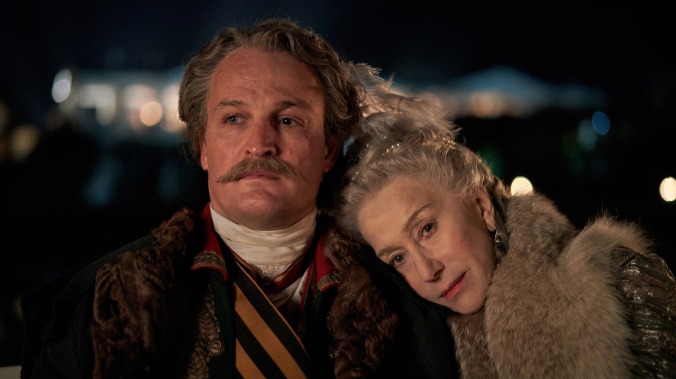Catherine The Great gets a lackluster love story in new miniseries


With its setting and imperious silver-haired protagonist, HBO’s Catherine The Great aims to fill the voids left by Chernobyl and Game Of Thrones—a combination of historical drama and sweeping, intrigue-fueled epic. The four-part miniseries, written by Nigel Williams and directed by Philip Martin, couldn’t have found a better eponymous lead than Helen Mirren, who is always at least vaguely regal, even when her character is at her lowest (or in Hobbs & Shaw). But Catherine The Great’s storytelling never manages to equal the grandeur of its richly detailed set design; as the series unfolds, those extravagant visuals become more and more like façades from the mythical Potemkin villages.
Mirren stars as Catherine II, the Russian monarch who came to power in 1762 as part of a coup she organized with her nobleman lover Grigory Orlov (Richard Roxburgh), ushering in the country’s Golden Age. Williams’ script wisely spares us Catherine’s upbringing in Germany (where she was born Princess Sophie of Anhalt-Zerbst), instead dropping right into the tense aftermath of Catherine’s takeover. Catherine’s embrace of all things Russian won her the hearts and minds of the people—and in real life, the approval of Empress Elizabeth—just as her concerns about her husband Peter III’s ability to rule garnered her the support to overthrow him. But that same boldness and political savviness quickly become liabilities for the men surrounding Catherine at court; her foreign minister Nikita Panin (Rory Kinnear) is already counseling her son Paul (Joseph Quinn) on succeeding his mother in the premiere episode.
The miniseries spans the entirety of Catherine’s reign, engaging with the power dynamics that threatened her rule and the reactionary narrative that sprang up following her death in 1796, but those threads are secondary in focus. Her exploits and empire-building are framed by her decades-long relationship with Grigory Potemkin (Jason Clarke), a mere lieutenant in one of the Russian army’s many regiments at the start of the series who, by Catherine’s order, eventually becomes a Prince Of The Holy Roman Empire. They pine for each other in person and in letters that, in real life, revealed a great intelligence, passion, and camaraderie. But the epistolary element of Catherine The Great is a weak imitation of its inspiration; like much of Williams’ writing, these letters fail to generate a palpable sense of longing, or the kind of all-consuming (albeit not everlasting) love drove the real Catherine to, in all likelihood, make Potemkin her consort.
Director Philip Martin (The Crown) does give the series a suitably epic look, whether he’s shooting a military invasion or Mirren walking down long hallways to symbolize Catherine’s ever-expanding path to unquestioned sovereignty. Mirren and Clarke deliver compelling performances as a clever, iron-willed queen and a soldier turned high-ranking statesman, respectively. Mirren has the upper hand, having portrayed several women, including Queen Elizabeth II, who faced overwhelming odds even after ascending to a seat of power. Her presence is magnetic, lending truth to many stories about the real Catherine’s considerable charm, which helped her curry favor with everyone from soldiers to entrenched nobles to her spiritual-if-not-direct predecessor, Elizabeth of Russia. We see some, but not nearly enough, of Catherine the great strategist and leader; early on, she gives a speech that outlines her desire to make her adopted homeland rival any European nation in reach and sophistication. This includes abolishing slavery, which doesn’t go over well with that crowd, then just never goes anywhere.
The real Catherine struggled to reconcile those progressive ideals with her obvious desire to consolidate power; she may have been an “enlightened” despot, but she was still a despot. But Catherine The Great doesn’t have nearly the same interest in the intricacies or even the more controversial aspects of her 24-year reign, the longest of any female leader in Russia, as it does her equally long relationship with Potemkin. We’re reminded time and again of their passion for each other—in their letters to each other, as well as the cheerleading efforts of Countess Bruce (Gina McKee, in a small but scene-stealing role), Catherine’s lady-in-waiting and confidante—but it amounts to little more than a frisson of sexual tension. This Russian drama (with a predominantly British cast) ends up with a couple of Greek choruses, in the form of a Fool (Clive Russell) who roams the palace ground, speaking drunkenly and portentously to those around him, and all the nobles, soldiers, and nobles at court who gush over this ostensible romance. Frankly, more sparks fly between the Countess and Potemkin, who initially engage in the kind of spirited, but still mostly clothed, fucking that’s characteristic of premium cable shows.
Historical epics are often interlaced with love stories; sometimes, as with retellings of the Trojan War, a tale of love found, lost, and battled over becomes an enduring myth. The trouble here is that Mirren and Clarke are more believable as friends and empire builders than they are ardent lovers. Mutual respect for their hard-won positions? Yes. An intense love that traverses time and geography? Not so much. When there’s so much mythology surrounding a larger-than-life historical figure, you need an entry point, a way to cut through the denigrating rumors and attempts by Catherine’s successor to undermine her legacy as one of the great driving forces in modernization. But Catherine The Great’s depiction of this romance turned friendship inadvertently turns it into just another specious legend about the Russian ruler.